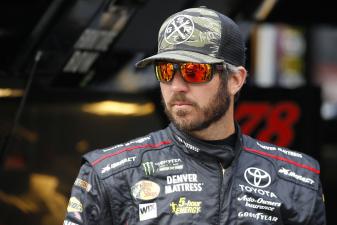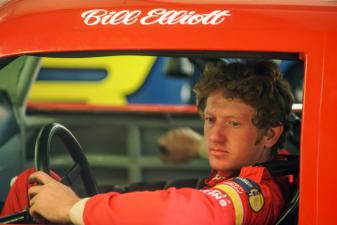An All-Time NASCAR Screw-Up

Journalists Al Pearce and Mike Hembree chronicle the journey of NASCAR’s best as they drive their way to that landmark first victory in 50 First Victories. With a combined ninety years of coverage of one of America’s grassroots sports, they bring a wealth of knowledge and experience to the stories of these fast-and-furious heroes, drivers who ran to the ragged edge—and often past it—in pursuit of the checkered flag. In this excerpt from the book, catch a sneak peek at Donnie Allison's path to victory.
Donnie Allison will be remembered mostly for a race he didn’t win. And that’s unfortunate. Allison had a more-than-respectable racing career, following his brother, Bobby, into the big time after short-track success and winning ten NASCAR Cup races. He won at Daytona Beach, Talladega, Charlotte, and Bristol. He won at Atlanta after one of the sport’s craziest scoring controversies. He drove in the Indianapolis 500 and finished fourth at racing’s most famous track as a rookie.
But Allison’s career forever will be linked to the 1979 Daytona 500 and its finish, one that has been repeated a bajillion times in video replays and in still photographs. For the three or four people who might not have heard, that race ended with Allison and Cale Yarborough crashing in the third turn while battling for the lead on the last lap. The pair continued that confrontation in the infield, along with Bobby Allison. It was a fight seen ’round the world, thanks to the cameras of CBS.
Richard Petty happily inherited the race lead and the win as the Allisons and Yarborough wrestled on Daytona’s infield sod. Donnie and Cale were left to explain the finish over and over and over again, even in their senior years. They long ago made up, but each will tell you he really should have won stock car racing’s biggest event.
Allison scored his first Cup victory in 1968 at North Carolina Motor Speedway in Rockingham. He had threatened to win in the previous months, finishing third at Atlanta, third at Martinsville, and second at Charlotte.
The Rockingham race was scheduled March 10 but was rained out and rescheduled June 16, which turned out to be a brutally hot day in the North Carolina Sandhills. Five-hundred-lap marathons at the one-mile track were tough under normal circumstances, but the mid-June heat added to the stress.
“It was a typical Rockingham race where different guys led,” Allison remembered. “I was in a race with somebody all day, be it Bobby or Richard or Cale or whoever. In the end, I felt like it proved the fact that I could drive a race car. Ralph Moody [owner/mechanic] had been telling the Ford people that for two years. He really helped me, really was persistent.”
Allison led 154 laps, including the final 129. He was more than two laps in front of brother Bobby, who finished second, at the checkered flag. The race lasted five hours and two minutes, a length not unusual in those days of 500-mile races at one-mile tracks.
“It was tough,” Allison said. “These guys run a 500-mile race now and jump out of the car and jump on it and all. In those days, they had to get us out of the car with a damn crane.” In other words, it was a long day.
Allison won in a Banjo Matthews–prepared car. Matthews was a NASCAR pioneer and is recognized as one of the sport’s all-time leading car builders.
“Banjo was not just smart in mechanical stuff; he was a good coach,” Allison said. “He knew what it took. He never once tried to boss me around. At Daytona and Talladega, every time he walked by me, he would say, ‘Can you hold it wide open?’ And I better not stutter. I better say yes.”
Allison won the 1970 Firecracker 400 at Daytona International Speedway in a Matthews car. “They gave the winner a boat, a camper, and a Rolex watch,” Allison said. “I remember Banjo asking me in victory lane which one I wanted. I said, ‘I’m going to get them all.’He said, ‘No, you’re not.’ Well, I got all of them. I gave the boat to my father and the watch to my oldest son. The camper—I don’t know where it is.”
Allison’s career took a bad turn in 1981 when he was seriously injured in a crash during the World 600 at Charlotte. His car hit the outside wall, dropped across the racetrack, and was hit by Dick Brooks’s following car. Allison suffered a broken left leg, a broken cheekbone, a fractured shoulder blade, several broken ribs, and a damaged lung. He recovered to race again but never returned to victory lane.
His last win occurred under a cloud of controversy in the Dixie 500 at Atlanta in 1978. Allison finished the race three car lengths in front of Richard Petty, but, after a recheck of scorecards, NASCAR declared Petty the winner. Allison and his car owner, Hoss Ellington, continued to press their case, and another scorecard check revealed that a scorer had missed one of Allison’s laps. Three hours and ten minutes after the race ended, NASCAR reversed its position and gave the win to Allison, who left the track before learning of his victory.
NASCAR President Bill France Jr. called the situation “an all-time NASCAR screw-up on scoring.”
It was Allison’s final checkered flag.




